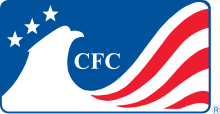Combined Federal Campaign
The Combined Federal Campaign (CFC) is the workplace giving program of the federal government of the United States. The program is authorized by executive order 12353 (as amended) of March 23, 1982, and is overseen by the United States Office of Personnel Management (OPM). Issued by President Reagan, the order states that a CFC objective is "to lessen the burdens of government and of local communities in meeting needs of human health and welfare ..." According to OPM's website, the mission of the CFC "is to promote and support philanthropy through a program that is employee focused, cost-efficient, and effective in providing all federal employees the opportunity to improve the quality of life for all".[1]

The federal regulations that govern the CFC are at 5 CFR §950.[2]
Origins
In 1957, President Dwight D. Eisenhower promulgated procedures for a program of charitable solicitation in the federal workplace and established the "President's Committee on Fund-Raising Within the Federal Service" to review and modify the fund-raising program (Executive Order No. 10728, 22 Fed. Reg. 7219, Establishing the President's Committee on Fund-Raising Within the Federal Service, Sept. 6, 1957).[3]
In 1961, President John F. Kennedy signed Executive Order 10927, "Abolishing the President's Committee on Fund-Raising Within the Federal Service and Providing for the Conduct of Fund-Raising Activities," which gave authority to the United States Civil Service Commission to organize nonprofit solicitations of federal government employees:[4]
... The Chairman of the Civil Service Commission is authorized to consult with appropriate interested persons and organizations, the national voluntary agencies, and the executive departments and agencies concerned. Such arrangements shall (1) permit true voluntary giving and reserve to the individual the option of disclosing his gift or keeping it confidential; (2) designate specific periods during which solicitations may be conducted; and (3) provide for not more than three solicitations annually, except in cases of emergency or disaster appeals for which specific provision may be made by the Chairman of the Civil Service Commission.
— John F. Kennedy, Executive Order 10927

Kennedy's executive order was eventually replaced[5] by President Ronald Reagan's 1982 executive order 12353, "Charitable Fundraising," which created the modern Combined Federal Campaign under the United States Office of Personnel Management.[6]
OPM's FAQ page states, "Historically, campaign costs nationwide have averaged ten percent. These funds were spent on printing materials, training volunteers, auditing contributions, and other administrative expenses." Prior to 2017, these costs were deducted from the donations to the charity. Beginning in 2017, charities were required to pay upfront fees to receive donations through the CFC. In 2017, total overhead costs exceeded 25% under the new model.
Prior to 2017, private charities – not the OPM – ran the CFC at the local level under the supervision of local federal employee boards. In 2017, the CFC was centralized under the control of OPM, which contracted the program's management to a government human resources contractor. Overhead dramatically increased as reported by The Chronicle of Philanthropy in an article titled, "Overhead Consumes Increasing Share of CFC Dollars". The for profit contractor was paid $12,393,828 to administer the CFC in 2017, plus $2,764,149 as the first of three payments to develop a new CFC software platform. OPM directed an additional $10,879,386 to for profit partnerships that conducted campaign promotion in OPM's newly established CFC Zones. Total CFC administrative costs exceeded 25% of donations pledged for 2017.
Participation
Contributions to the CFC totaled $12.9 million in 1964, $82.8 million in 1979, and peaked at $282.6 million in 2009. In 2011, CFC pledges totaled $272.7 million with 24% of the federal workforce participating and an average employee pledge of $284.27.[7] In 2012, OPM began the process restructuring the CFC, by establishing the CFC-50 commission, followed by draft rules in 2013. The vast majority of CFC stakeholders that submitted comments in the public comment period opposed key aspects of the proposed rules. The CFC donations began to decline in this period. In the last year of the historical structure with charities operating the CFC, 2016, donations to the CFC totaled $167 million with employee participation at 10.7 percent. Under the first year of OPM's new centralized structure, donations dropped 39% to $101 million and employee participation dropped to 4.3%.
The number of participating charities was estimated in 2012 at more than 20,000 nonprofit organizations worldwide.[8] Organizations wishing to participate must submit a new charity application annually.[9] Beginning in 2017, OPM began charging charities upfront fees in order to participate in the CFC. Application and listing fees were tiered based on the size and nature of the charity. Application fees collected from charities totaled $3,498,745 and listing fees totaled $5,766,385. 8,573 charities opted to pay the upfront fees and participate in the CFC. After the 2017 CFC campaign concluded, OPM announced that, pursuant to provisions in the new rules, a 16.5% distribution fee (totaling $16,772,233) would be charged on donations to cover the cost of the CFC. Early reports are that the number of charities participating in 2018 will drop by approximately 9%
Terrorist screening controversy
In 2004, the program added a new requirement that all organizations participating in the CFC must certify that they screen all of their employees against government-created blacklists, intended to identify people involved in "terrorist activities". This resulted in the American Civil Liberties Union (ACLU) resigning from the CFC July 31, 2004, because such checks violate their principles. In November 2004, the ACLU and 12 other non-profit organizations filed a lawsuit challenging this policy. Since then, in November 2005, the OCFCO has put out revised requirements. The new regulation requires that each federation, federation member, and un-affiliated organization applying for participation in the CFC must, as a condition of participation, complete a certification that it is in compliance with all statutes, Executive orders, and regulations restricting or prohibiting U.S. persons from engaging in transactions and dealings with countries, entities, or individuals subject to economic sanctions administered by the U.S. Department of the Treasury's Office of Foreign Assets Control (OFAC). In essence, the charities have to certify that the organizations that they support are not considered terrorist organizations by the US Government. While the ACLU was not in the CFC for 2005, these revised requirements seem to have satisfied most of the charities who complained. In 2007, the ACLU returned to the CFC.
References
![]()
- The Combined Federal Campaign
- Fundraising, Ethics Counselor's Deskbook (PDF), 2013, retrieved 2014-09-12
- Kennedy, John F. (March 18, 1961), Executive Order 10927, Gerhard Peters and John T. Woolley, The American Presidency Project., retrieved January 29, 2014
- Executive Orders Disposition Tables, John F. Kennedy – 1961, U.S. National Archives and Records Administration, retrieved January 29, 2014
- Reagan, Ronald (March 18, 1961), Executive Order 12353, Gerhard Peters and John T. Woolley, The American Presidency Project., retrieved January 29, 2014
- Federal Advisory Committee Report on the Combined Federal Campaign (PDF), CFC-50 Commission Report U.S. Office of Personnel Management, 2012, retrieved January 29, 2014.
- Federal Advisory Committee Report on the Combined Federal Campaign (PDF), CFC-50 Commission Report U.S. Office of Personnel Management, 2012, retrieved January 29, 2014
- Combined Federal Campaign Information for Charities, U.S. Office of Personnel Management, retrieved January 29, 2014.
- "ACLU and Coalition Challenge Government Watch List Policy", Civil Liberties (The ACLU national newsletter), Winter 2005.